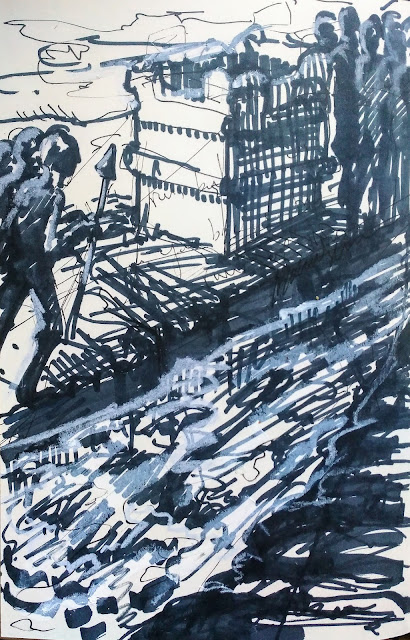Capture the crossing
make breath into death
the sibilant tongue, a knife's edge
[For full chapter, click here The figure of Jephtha is introduced with ominous parallels to Abimelekh, raising the essential question: will he be loyal to the Father or to the Son, a recreation of the heroic Gideon, or of his faithless bastard?
Initially, Jephtha aligns himself with the Father, tying every action to the Lord who will "listen", fashioning himself as a recreation of Moses.
Yet in this chapter, the question moves center stage, as Jephtha finds himself in a replay of Gideon's situation. Like Gideon, who fought along the liminal, definitive banks of the Jordan, Jephtha is at the fords of the river, with a leitword of a'v;r, passage, crossing. As in the case of Gideon, the men of Ephraim "call" (va'yatzek ויצעק, a direct echo of 8: 25) an urgent gathering, and attack him for not calling them to join the fight. This time, they are more violent in their denunciation, threatening to burn the house down upon Jephtha (something that ironically Jephtha has already done to himself, in promising to sacrifice his one and only daughter as a "burnt offering").
Yet here the parallel between Jephtha and Gideon breaks down. Even as Jephtha tries to fashion himself as a new version of Gideon who "put my soul (נפש, nefesh) in my hand, and crossed to fight the sons of Amon", in an echo if Gideon who "send his soul (נפש, nefesh) forth to save you", his reaction to Ephraim's accusations is diametrically opposed to Gideon's. Gideon does not punish an excess of involvement. Instead, he soothes Ephraim by lauding their achievements. Jephtha, by contrast, hurls back accusations. "I summoned you, but you did not save me" he counters--a childish non-sequitur that once again reveals his almost naked vulnerability, his damaged psyche as a rejected child. Ephraim, after all, did not ask to lead the war and "save" Gilead--they asked why they were not summoned to join the battle once it was happening. In contrast to Gilead who uses his "word" (d'v'r) to "defuse their spirit when he spoke this speech" (בדברו הדבר הזה), Jephtha rallies Gilead to "slaughter" over 40000 members of Ephraim in a murderous spree that puts Abimelekh to shame.
There is a price to Jephtha's fanatical commitment to the reality of language. Gideon can use language diplomatically, to sooth and loosten. Jephtha, by contrast, destroys. In the previous chapter, his commitment to the "blurting" of his mouth cost him his daughter. Here, he makes pronunciation itself a matter of life and death: Ephraim are judged on the literal placement of the tongue, as saying an "s" instead of "sh" condemns them to slaughter.
It is ironic and telling that this first civil war takes place between the "sons of Joseph", the twin tribes who throughout the Book of Joshua hover between two and one, so close they are almost a single entity, as alike as the almost interchangable "s" and "sh". "You are fugitives of Ephraim," the Ephraimites taunt, "Gilean is within Ephraim and within Menasseh."
To Jephtha, a fugitive betrayed by his own brothers, this taunt is unbearable. Unable to appease his brother-tribe, he seeks instead to assert a demarcation as clear as the definitive river, as life and death. In doing so, he moves the Book of Judges to its darkest point yet.]





